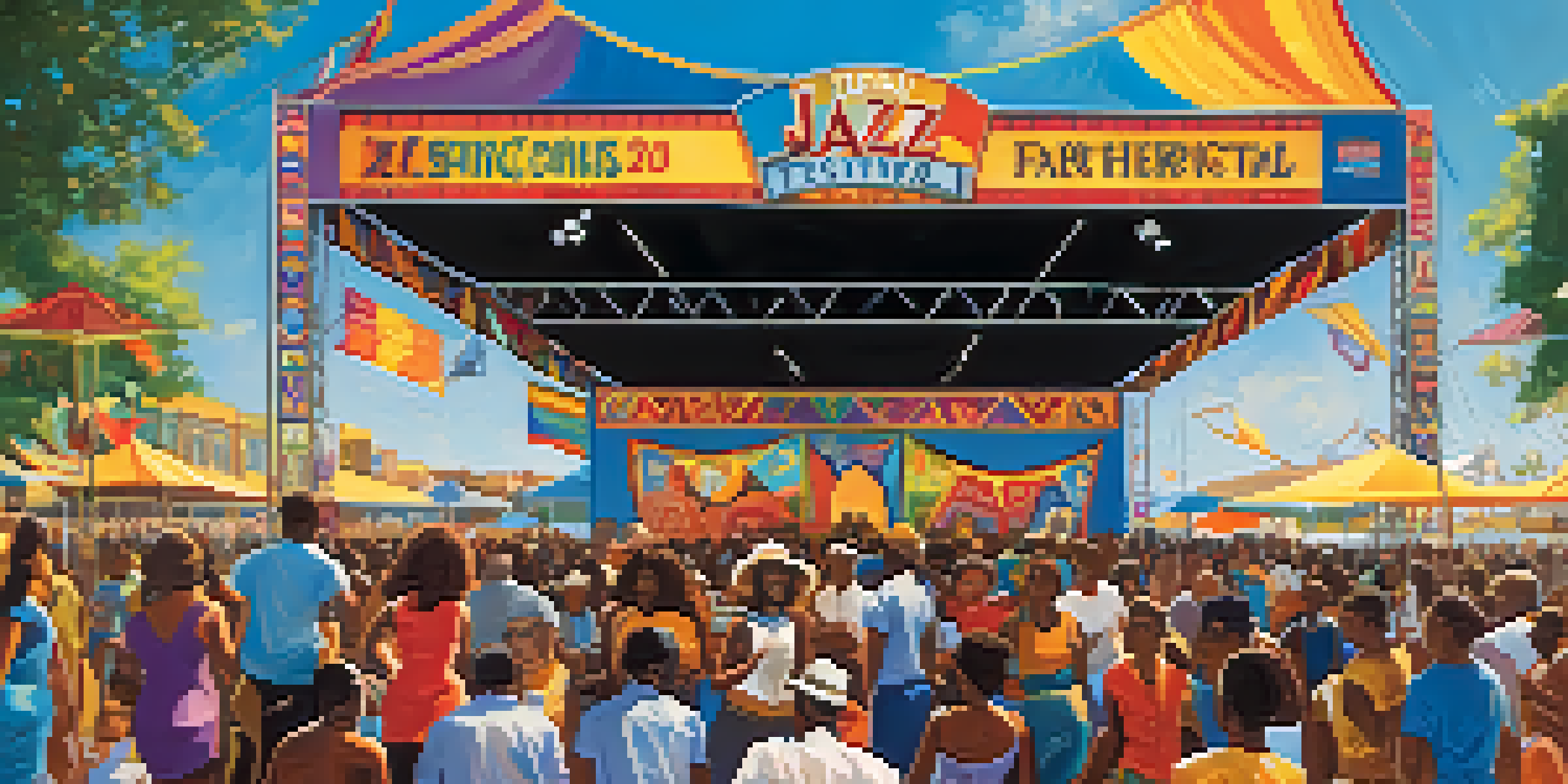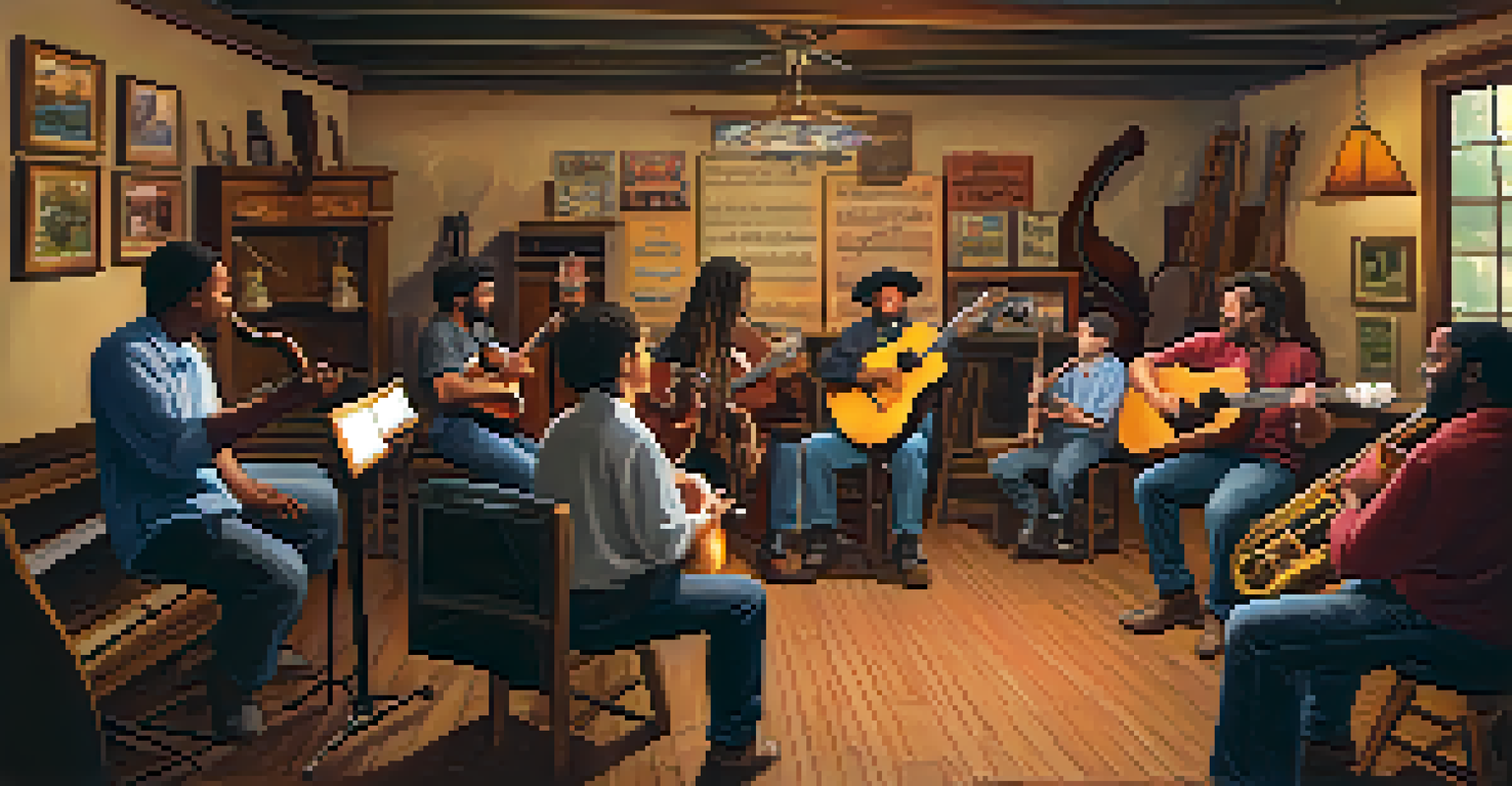The Role of Folk Music in Preserving Louisiana's Heritage

Understanding Louisiana's Unique Cultural Landscape
Louisiana is a melting pot of cultures, influenced by French, African, Spanish, and Native American traditions. This rich tapestry creates a vibrant cultural landscape that is reflected in its folk music. The unique blend of these influences makes Louisiana's musical heritage distinct and essential to its identity.
Music is the shorthand of emotion.
Folk music serves as a historical record, capturing stories, struggles, and celebrations of the people. For example, the sounds of Zydeco and Cajun music reflect the experiences of the Acadian settlers and their adaptation to life in Louisiana. Through melodies and lyrics, these genres convey the emotions and experiences of generations.
Additionally, folk music fosters a sense of community among Louisianans, creating bonds through shared cultural experiences. Events like festivals and gatherings often feature folk music, uniting people from diverse backgrounds in a celebration of their heritage.
Folk Music as a Storytelling Medium
At its core, folk music is about storytelling, and Louisiana's folk songs are no exception. They often recount tales of love, loss, and local legends, weaving a narrative that connects listeners to their roots. This storytelling aspect allows the music to transcend generations, keeping history alive.

For instance, songs like 'Jolie Blon' and 'Big Mamou' not only entertain but also share the experiences of the people who lived them. Through these songs, listeners gain insight into the life and struggles of Louisiana's communities, forming a deeper connection with their heritage.
Cultural Melting Pot of Music
Louisiana's folk music reflects a unique blend of French, African, Spanish, and Native American influences, shaping its vibrant cultural identity.
Moreover, the oral tradition of passing down these songs ensures that the stories remain vibrant. As each generation adds its own interpretations, the music evolves while still honoring its origins, creating a dynamic historical tapestry.
The Role of Festivals in Celebrating Folk Music
Festivals play a crucial role in preserving and promoting Louisiana's folk music. Events like the New Orleans Jazz & Heritage Festival and the Cajun & Creole Music Festival showcase local talent and celebrate the state's musical heritage. These gatherings not only draw tourists but also instill pride in local communities.
Folk music is a way of expressing the soul of a community.
During these festivals, folk music takes center stage, allowing artists to share their culture with a wider audience. Through performances, workshops, and dance, attendees experience the heart and soul of Louisiana's musical traditions firsthand. This immersive experience fosters a deeper appreciation for the art form.
Furthermore, festivals serve as a platform for the next generation of musicians. Young artists are inspired by seasoned performers, ensuring that the legacy of folk music continues. This intergenerational exchange is vital for keeping the music alive and relevant in today's world.
The Influence of Folk Music on Contemporary Artists
Louisiana's folk music has not only preserved its heritage but has also influenced contemporary artists across genres. Musicians today often incorporate traditional elements into their work, creating a fusion of old and new. This blending of styles helps to keep folk music fresh and accessible to younger audiences.
Artists like Nathan and the Zydeco Cha Chas and The Lost Bayou Ramblers exemplify this influence, seamlessly merging traditional sounds with modern sensibilities. By doing so, they attract a diverse fan base while honoring their cultural roots. This evolution ensures that the music remains relevant in a changing musical landscape.
Storytelling Through Folk Music
Folk music in Louisiana serves as a powerful storytelling medium, preserving the history and experiences of its communities across generations.
Moreover, collaborations between folk musicians and artists from other genres further expand the reach of Louisiana's musical heritage. These cross-genre partnerships invite new listeners to appreciate the depth and richness of folk music, creating a broader cultural dialogue.
Preserving Louisiana's Heritage Through Education
Education plays a vital role in preserving Louisiana's folk music heritage. Schools and community programs often include music history lessons that highlight the significance of local folk traditions. By teaching the younger generation about these cultural treasures, we ensure their longevity.
Workshops and classes offered by local musicians provide hands-on experiences for students eager to learn. These interactive sessions foster a love for folk music and its history, encouraging students to participate in their cultural legacy. Such initiatives are crucial for maintaining the vibrancy of Louisiana's musical landscape.
Furthermore, educational institutions often collaborate with local artists to create programs that celebrate folk music. This partnership not only enriches the curriculum but also strengthens the community's connection to its heritage, ensuring that folk music continues to thrive.
The Impact of Technology on Folk Music Preservation
In today's digital age, technology has become a powerful tool for preserving and promoting folk music. Online platforms allow musicians to share their work with a global audience, expanding the reach of Louisiana's unique sound. This accessibility helps to foster an appreciation for the state's cultural heritage worldwide.
Social media also plays a significant role in connecting artists with fans, creating a vibrant online community. Through platforms like Instagram and YouTube, musicians can showcase their performances and share their stories, keeping folk music alive in the digital realm. This online presence is essential for engaging younger audiences.
Challenges Facing Folk Music
Louisiana's folk music is threatened by commercialization, declining performance venues, and an aging musician population, highlighting the need for new talent.
Additionally, digital archives and streaming services help document and preserve folk music for future generations. These resources ensure that the rich history of Louisiana's music remains accessible, allowing listeners to explore the past while supporting contemporary artists.
Challenges Threatening Folk Music in Louisiana
Despite its rich heritage, Louisiana's folk music faces several challenges in today's society. One of the primary concerns is the commercialization of music, which can dilute the authenticity of traditional sounds. As artists strive for wider recognition, they may feel pressured to conform to mainstream trends, risking the loss of their cultural roots.
Additionally, the decline of local venues and performance spaces poses a threat to the folk music scene. As fewer places support live music, artists struggle to find opportunities to showcase their work. This not only affects musicians' livelihoods but also diminishes the community's access to authentic folk performances.

Lastly, the aging population of folk musicians raises concerns about the future of Louisiana's musical heritage. As seasoned artists retire, there is an urgent need for younger musicians to step up and carry the torch. Ensuring the survival of folk music depends on nurturing new talent and maintaining the cultural connection that binds communities together.